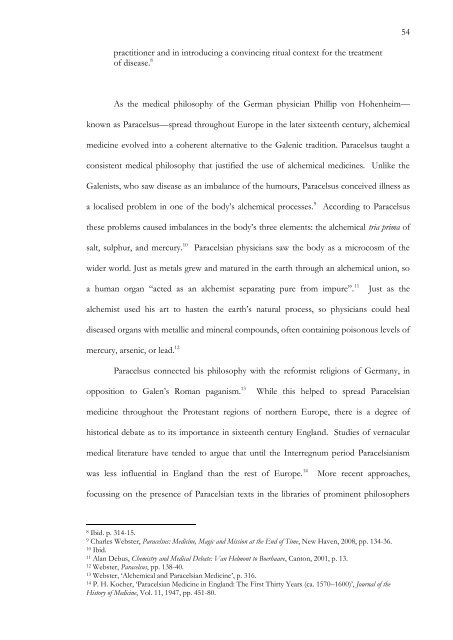The Alchemical Patronage of Sir William Cecil, Lord Burghley
The Alchemical Patronage of Sir William Cecil, Lord Burghley
The Alchemical Patronage of Sir William Cecil, Lord Burghley
Create successful ePaper yourself
Turn your PDF publications into a flip-book with our unique Google optimized e-Paper software.
practitioner and in introducing a convincing ritual context for the treatment<br />
<strong>of</strong> disease. 8<br />
As the medical philosophy <strong>of</strong> the German physician Phillip von Hohenheim—<br />
known as Paracelsus—spread throughout Europe in the later sixteenth century, alchemical<br />
medicine evolved into a coherent alternative to the Galenic tradition. Paracelsus taught a<br />
consistent medical philosophy that justified the use <strong>of</strong> alchemical medicines. Unlike the<br />
Galenists, who saw disease as an imbalance <strong>of</strong> the humours, Paracelsus conceived illness as<br />
a localised problem in one <strong>of</strong> the body‘s alchemical processes. 9 According to Paracelsus<br />
these problems caused imbalances in the body‘s three elements: the alchemical tria prima <strong>of</strong><br />
salt, sulphur, and mercury. 10 Paracelsian physicians saw the body as a microcosm <strong>of</strong> the<br />
wider world. Just as metals grew and matured in the earth through an alchemical union, so<br />
a human organ ―acted as an alchemist separating pure from impure‖. 11 Just as the<br />
alchemist used his art to hasten the earth‘s natural process, so physicians could heal<br />
diseased organs with metallic and mineral compounds, <strong>of</strong>ten containing poisonous levels <strong>of</strong><br />
mercury, arsenic, or lead. 12<br />
Paracelsus connected his philosophy with the reformist religions <strong>of</strong> Germany, in<br />
opposition to Galen‘s Roman paganism. 13 While this helped to spread Paracelsian<br />
medicine throughout the Protestant regions <strong>of</strong> northern Europe, there is a degree <strong>of</strong><br />
historical debate as to its importance in sixteenth century England. Studies <strong>of</strong> vernacular<br />
medical literature have tended to argue that until the Interregnum period Paracelsianism<br />
was less influential in England than the rest <strong>of</strong> Europe. 14 More recent approaches,<br />
focussing on the presence <strong>of</strong> Paracelsian texts in the libraries <strong>of</strong> prominent philosophers<br />
8 Ibid. p. 314-15.<br />
9 Charles Webster, Paracelsus: Medicine, Magic and Mission at the End <strong>of</strong> Time, New Haven, 2008, pp. 134-36.<br />
10 Ibid.<br />
11 Alan Debus, Chemistry and Medical Debate: Van Helmont to Boerhaave, Canton, 2001, p. 13.<br />
12 Webster, Paracelsus, pp. 138-40.<br />
13 Webster, ‗<strong>Alchemical</strong> and Paracelsian Medicine‘, p. 316.<br />
14 P. H. Kocher, ‗Paracelsian Medicine in England: <strong>The</strong> First Thirty Years (ca. 1570–1600)‘, Journal <strong>of</strong> the<br />
History <strong>of</strong> Medicine, Vol. 11, 1947, pp. 451-80.<br />
54















